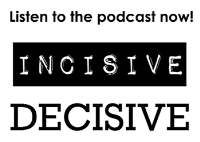.png?width=1627&height=517&name=Full%20TCA%20Logo%20(Purple).png)
Returning to a subject which I haven’t spoken about in these pages for a while, I have had a reason to start to consider commoditisation again of late.
Because I haven’t spoken about it doesn’t mean it wasn’t important and didn’t mean that it wasn’t continuing to happen as fast as ever, or even faster, in the world around me.
The dynamic between commoditisation and de-commoditisation is one that is absolutely fundamental when you consider how you want your life to be, how you want your business to be and how you want your work to be.
Many of the jobs we did ten years ago are already commoditised, they’re not special anymore, and if they can’t be done with a robot or artificial intelligence, they can certainly be done by somebody much less expensive than you.
Throughout the industry that I work in, commoditisation is rife as ‘the market’ finds its level for so many different things.
What will you do to counter this? What will you do to react? Because there are stories abound and examples in front of your face of people who have bucked the trend and de- commoditised the commodities.
Probably the best one for you to consider, or certainly the one closest to your nose would be Starbucks.
Starbucks sell the second most commonly traded commodity in the world direct to consumers (sugar is the only commodity traded more than coffee)
So how did they manage to jump from a cup of coffee in the United States that always cost less than $1 to bespoke coffee that costs $5 a cup?
It’s worth looking at that example and seeing how a business can remain successful (it’s the leading coffee house in China) despite a hugely aggressive marketplace and ferocious competition.
The other one I like to think about is razor blades.
Imagine you were Gillette no… look at what’s happening to them.
Almost all men are growing a beard (at least for part of the week) and if that isn’t crippling enough, the mail order shave companies are slashing their market share and slashing their profits.
I’m told that Gillette’s strategy is ‘stay alive’
Why’s that important to what we’re doing? Let me give you an example…
We were the first practice in the UK to ever mill a surgical guide on the Sirona platform – I know that for a fact.
When we tried to buy the blocks to mill the guides there weren’t any in the UK and they had to come from Germany specifically for us.
That was less than four years ago.
We set up a practice that was able to produce guided surgery guides for ourselves so that we had an understanding of exactly how they worked, the design process, the tolerances and the materials and within a short space of time there are multiple providers around the country that can do this cheaper (and probably even better than we can) on next day delivery. What a horrible thought for my business model!!
What happened there was that my de-commoditised product became commoditised and I hadn’t differentiated it so that it was different and therefore more valuable.
I am unlikely to de-commoditise it now. The only thing that can make that better is service and if the £50 per guide providers on a next day delivery are able to provide a guide that is well finished and fits, where does that leave me??
The same thing runs right through your business and so I look with despair at the guys who are now regularly under £1000 for dental implant placement and wonder how they think they’re going to persist when their competitors (and they always get to that price due to competition) go cheaper than them again.
If you’ve set your business up on a commodity model then you’re in the volume business, and if you’re in the volume business you’re not in the quality business, and if you’re not in the quality business in dental implants then you’re probably in the death business.
So, the trick going forwards is this…
- Learn how to de-commoditise yourself as fast and as effectively as possible and then continue to de-commoditise yourself as much as you can for the rest of your career.
- Find the things in your business that are being commoditised that you can’t alter then outsource them and move along and don’t attach any emotional energy to it.
Blog Post Number: 1832






Leave a comment